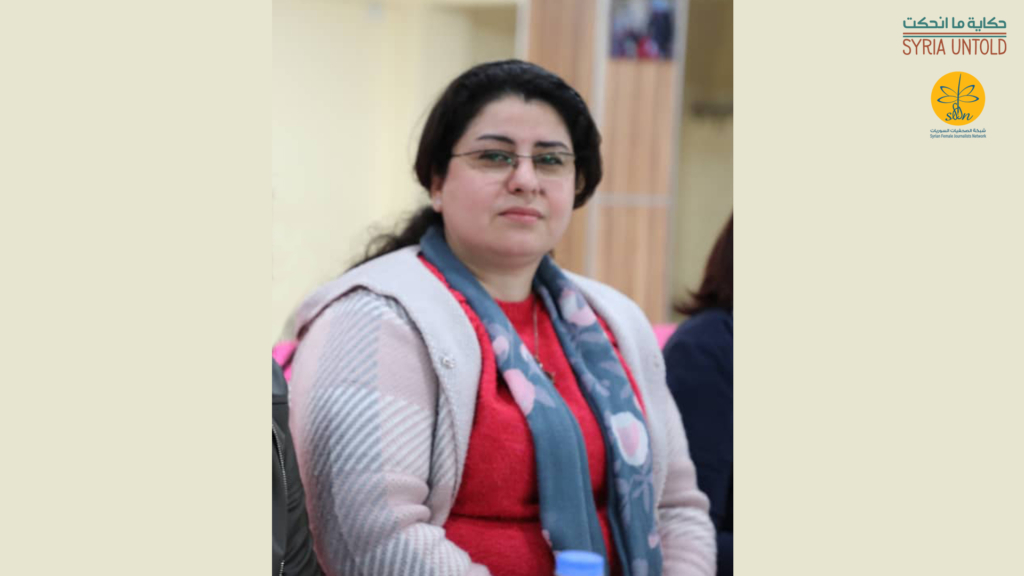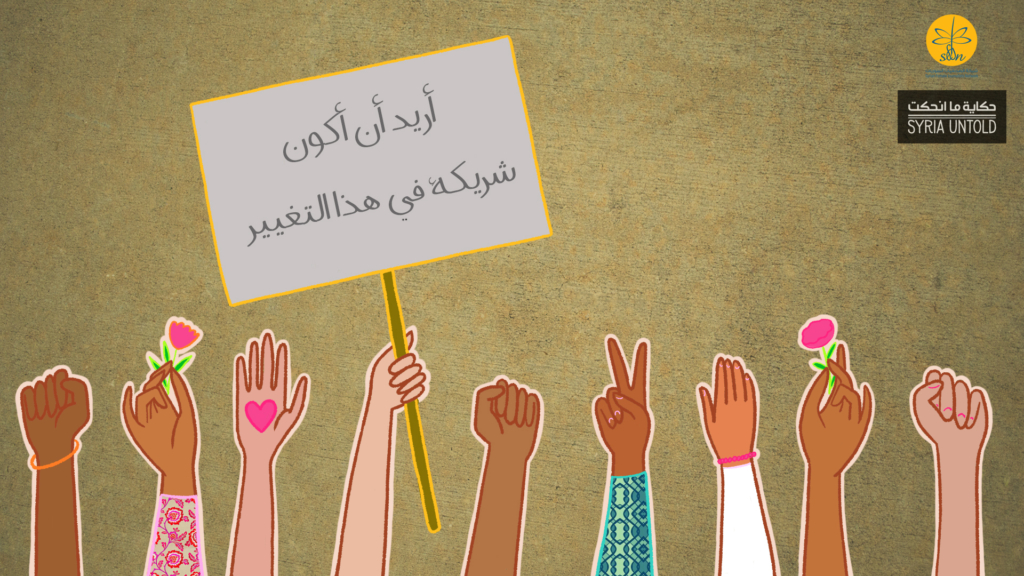Lina Barakat: ‘I want to be a partner in this change’
“Why can’t I be a participant, rather than a mere spectator? Even if I have to make sacrifices, I am willing to do so because nothing comes without a price.”
Avin Youssef
This article was published with the cooperation and partnership of Syria Untold, as part of the Women, Peace and Security program.
Born in Homs in 1979, Lina Barakat grew up in a relatively open-minded family. She studied French literature at Al-Baath University in Homs, later obtaining a master’s degree and working as a teaching assistant. She has long had an interest in women’s issues.
Her interest emanated not only from her own experiences, but also from the experiences of other women around her.
“Our society has a condescending perception of women…even if women grow up within an understanding and liberal family,” Barakat tells SyriaUntold.
“At the family and personal levels, my parents were very understanding, and they never discriminated between us based on gender. The space was always open for us as girls in the family. But my interest in women’s issues stemmed from the incidents around me that happened to a neighbor, relative, friend or peer. I would see the extent of injustice against women and would always wonder why,” she says.
Barakat started her quest for answers, especially amid the “amount of contradictions” she found when she read some religious books and other books tackling women’s affairs, and compared them to what was happening in society. All this made her think of herself: “How long will I keep going round in circles without being able to achieve anything?”
Right to self-determination
Barakat witnessed a plethora of injustices during Baath rule, before the outbreak of the Syrian revolution in 2011, and based on her reading of Syria’s Personal Status Law and cases of divorce, killing and discrimination against women. Even at the personal level, as a woman, she could not represent herself in her marriage, since her father was deceased. Her brother was appointed on her behalf. She was struck by her inability to decide her own fate, even in marriage, although she was fully capable of doing so, as she was 30 years old and held a master’s degree.

All these reasons motivated her to go on a journey of self-search and to find out where she stood in society. Most questions remained stuck in her head, including why she could not take the decision herself to seek her divorce. Why was she compelled to resort to courts to apply for khula, or divorce, in Islamic jurisprudence? That route often results in the woman making major concessions, according to Barakat, such as giving up custody of children, returning the dowry (mahr), and deferred marital payment (muakhar al-Sadaq).
The rebellious woman inside her was convinced only by the answers she personally sought and discovered, and the convictions and ideas she reached.
Women’s rights are human rights
For Barakat, women’s rights are not solely a legal issue, but also a humanitarian one. But, the law gives people a motive to keep chasing the right path.
“Why can’t I be a participant, rather than a mere spectator? Even if I have to make sacrifices, I am willing to do so because nothing comes without a price. When I saw all these achievements, from Dar el-Mara [a women’s rights organization] to the Women’s Law [a group of laws passed by Self-Administration authorities meant to promote women’s rights] and the Syrian Women’s Commission [a women’s rights body within the Self-Administration], and when I realized that women can be present in each aspect of the administration in the region, I decided to be part of this accomplishment as long as I had the capacity, energy and desire to improve the situation of women, including myself.”
Maarouf Barakat, Lina’s brother, tells SyriaUntold: “I think Lina’s decision and work is humanitarian. Defending women’s rights in society is a humanitarian duty first and foremost. She chose a rough and thorny path to defend rights, and it requires an insistent, persistent and resistant character like hers. I have always seen this special character in Lina since she was a kid at school, university and even in her marriage. She never has and never will accept to be humiliated or subdued. I am proud of her, and I think she will have a bright future in her humanitarian track.”
A wide network
In 2017, Barakat moved to northeastern Syria, controlled by the majority-Kurdish Self-Administration governing authority. She had to adapt to her new environment, especially the language, as the majority of people in that region were Kurds and spoke Kurdish. She found it difficult to communicate with people.
Despite the difficulties, Barakat now serves as the General Coordinator for The Syrian Women’s Council, an independent body based in Qamishli advocates for women’s rights. After taking on the role, it was important for her to widen her network of relations and carry out related activities and events. She reached out to women in different Syrian cities, and they took on positions in the council’s executive board. Those women represent organizations in Damascus, the Syrian coast, Suwayda, Homs, Aleppo and other cities.
Members are also active in the al-Hol displacement camp in northeastern Syria, where many wives and children of former Islamic State fighters are being held by majority-Kurdish authorities. Activists from the women’s council are implementing a new work project with the camp’s migrant women department, according to Barakat. They manage centers in all the camps in the region and primarily focus on political empowerment, since women’s involvement in politics is relatively limited.
“I noticed that women are always afraid of politics, and I wanted to work on this aspect, knowing that politics is at the core of women’s issues. Politics exploits religion, and religion is the pretext through which women are exploited. If women do not engage in the political field properly and do not acknowledge their role and place, their rights will remain missing and their cause ongoing,” Barakat says.
Barakat has tried expanding her network of relations to reach an international level, but bodies such as the UN and EU “were not impartial,” as she put it.
Most recently, Barakat chose to expand her network through social media and Zoom, holding workshops with the participation of some Arab and international figures and organizations. But, she noted that their responsiveness is low, as she believes their work is often linked to certain agendas or politics.
A new environment
Barakat has found herself at home in northeastern Syria, despite her previous language barriers. “My trust was in the right place, and I was surprised with their warm and loving welcome, their respect and their appreciation of this simple initiative that I took to become a partner in the women’s movement in the region. Their support was vital for me, and I did not feel estranged. Even when they found out I was from Homs, their welcome was even warmer. Naturally, we realize that we are not in a perfect city and that the image we aspire to is not totally ideal. I was aware of Al-Jazira region and its mostly tribal nature, be it Arab, Kurdish or Syriac. In such an environment, women always face restrictions and [their rights] are encroached upon. But, compared to all that I have mentioned, the situation was fine. I won’t say it was perfect, but it was fine. For such progressive ideas to come out of such an environment is truly a miracle!”
Barakat does not deny the challenges and obstacles in such an environment, which is “rife with customs, backward traditions, poverty, lack of interest in education and the low number of people who have obtained an education, especially women, the majority of whom were married at a young age and handed relatively huge responsibilities. Such an environment evidently requires huge efforts and a struggle for change. We don’t have a magic wand to alter the situation suddenly. I did not feel shocked, because it is nice to come to such an environment and carry out the much-needed work.”

